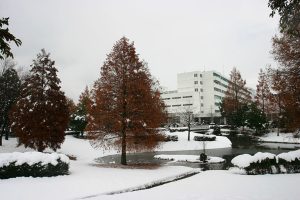Current Position
Department of Environmental Science, Faculty of Agriculture Gazipur Agricultural University, Gazipur 1706
Head,
Department of Wood Science
and Technology, Faculty of Forestry
and Environment, Gazipur Agricultural
University, Gazipur 1706
Breif of Prof. Dr. Md. Manjurul Haque
Dr. Md. Manjurul Haque is a Professor of Gazipur Agricultural University (formerly Bangabandhu Sheikh Mujibur Rahman Agricultural University). He obtained Bachelor of Science in Agriculture (B. Sc. Ag.) and Master of Science (MS) in Plant Pathology degrees from Bangladesh Agricultural University (BAU), Mymensingh, and securing first class in both cases. He went to Denmark and Japan as a DANIDA (Danish International Development Agency) fellow and Japanese Government Scholar and did postgraduate diploma in Seed Pathology (2021) and PhD in Agricultural Sciences (2004) at Royal Veterinary and Agricultural University (currently Copenhagen University), Denmark and Gifu University, Japan, respectively. Dr. Haque did Post-doc as a JSPS Postdoctoral research Fellow (2005 -2007) at Shizuoka University, Japan. He started his career as a Scientific Officer (Division of Plant Pathology) at the Bangladesh Jute Research Institute in 1996, and became a Senior Scientific Officer in 2004. On 23 July 2008, Dr. Haque joint in Bangabandhu Sheikh Mujibur Rahman Agricultural University (currently Gazipur Agricultural University) as an Assistant Professor at the Department of Bioenvironmental (currently environmental) Science and became Associate professor (2013) and Professor (2017). He led the Department of Environmental Science as Head and launched MS and Ph.D. programs. The notable contributions of Dr. Haque are identification of >400 biofilm producing bacteria from diverse ecosystems of Bangladesh though gene sequencing and development of biofilm-mediated bioremediation of dyeing wastewater technology and biofilm biofertilizers. Dr. Haque published 63 research articles in different international/SCOPUS (40 articles) and National (23 articles) journals including Chemosphere, Environmental Pollution, Journal of Environmental Chemical Engineering, Journal of Environmental Health Science and Engineering, Journal of Material Cycles and Waste Management, Scientific Reports, Journal of Bacteriology, Frontiers in Microbiology, Research in Microbiology, Archives of Microbiology, Frontiers in Environmental Science, Journal of Water Chemistry and Technology, Biocatalysis and Agricultural Biotechnology, Saudi Journal of Biological Sciences, Agricultural Research, Journal of Integrative Agriculture, Heliyon, and International Journal of Environmental Science and Technology. He has supervised >50 MS students and completed a good number of research projects as Principal investigator funded by BAS-USDA Endowment Program, Ministry of Education, Ministry of Science and Technology, and University Grants Commission of Bangladesh.
Educational Qualifications
.
 Postdoctoral Research under JSPS program, Shizuoka University, Japan
Postdoctoral Research under JSPS program, Shizuoka University, Japan
(July 2005 to June 2007)
.
 PhD in Agricultural Science (Biological Environment), Gifu University,
PhD in Agricultural Science (Biological Environment), Gifu University,
Japan, 2004
 Postgraduate Diploma in Seed Pathology, The Royal Veterinary and Agricultural University
Postgraduate Diploma in Seed Pathology, The Royal Veterinary and Agricultural University
(currently Copenhagen University), Copenhagen, Denmark,
2001
MS in Plant Pathology, First Class, Bangladesh Agricultural University, Mymensingh, 1996
Mymensingh, 1996
Bachelor of Science in Agriculture, First Class, Bangladesh Agricultural University, Mymensingh, 1991
.
 Higher Secondary Certificate, Science Group, First Division, Dhaka Board, 1987
Higher Secondary Certificate, Science Group, First Division, Dhaka Board, 1987
Secondary School Certificate, Science Group, First Division, Dhaka Board, 1985
.
………
Scholarship/Fellowship
.
 DANIDA fellowship (Denmark) to pursue postgraduate
DANIDA fellowship (Denmark) to pursue postgraduate
Diploma in Seed Pathology (1999)
.
 Monbukagakusho scholarship (Japan) to pursue PhD in Agricultural Science
Monbukagakusho scholarship (Japan) to pursue PhD in Agricultural Science
(2021–2004)
.
 JSPS fellowship (Japan) to conduct postdoctoral research
JSPS fellowship (Japan) to conduct postdoctoral research
(2005–2007)
.
Professional experiences
.
 Professor, Department of Environmental Science, Faculty of Agriculture, Gazipur Agricultural University, Bangladesh, 2 May 2017 to date
Professor, Department of Environmental Science, Faculty of Agriculture, Gazipur Agricultural University, Bangladesh, 2 May 2017 to date
Associate Professor, Department of Environmental Science, Faculty of Agriculture, Bangabandhu Sheikh Mujibur Rahman Agricultural University, Bangladesh, 2 May 2013 to 1 May 2017
Assistant Professor, Department of Bioenvironmental Science, Faculty of Agriculture, Bangabandhu Sheikh Mujibur Rahman Agricultural University, Bangladesh, 23 July 2008 to 1 May 2013
.
 Principal Scientific Officer (In charge), Department of Microbiology, Bangladesh Jute Research Institute, Manik Mia Avenue, Dhaka-1207, Bangladesh, 24 January 2008 to 22 July 2008
Principal Scientific Officer (In charge), Department of Microbiology, Bangladesh Jute Research Institute, Manik Mia Avenue, Dhaka-1207, Bangladesh, 24 January 2008 to 22 July 2008
Senior Scientific Officer, Department of Microbiology, Bangladesh Jute Research Institute, Manik Mia Avenue, Dhaka-1207, Bangladesh, 23 September 2004 to 22 July 2008
Scientific Officer, Division of Plant Pathology, Bangladesh Jute Research Institute, Manik Mia Avenue, Dhaka-1207, Bangladesh, 30 June 1996 to 22 September 2004
.
Research Interest
- Discovery of multifunctional novel bacteria from diverse ecosystems
- Construction of climate-smart biofertilizers and biopesticides
- Bioremediation of industrial wastewater, heavy metals and pesticides
- Mitigation of emission of greenhouse gases
- Genomics, gene function, expression & regulation
Taught Courses
- ENS 355 Environmental Degradation and Management (BS Level)
- ENS 501 Principles of Environmental Science (MS Level)
- ENS 535 Environmental Microbiology (MS Level)
- ENS 541 Global Warming and Climate Change (MS Level)
- ENS 575 Organic Farming and Food Safety (MS Level)
- ENS 610 Environmental Biotechnology and Genetic Engineering (PhD Level)
- ENS 625 Applied Environmental Microbiology (PhD Level)
Featured Publications
- Saha, C, Pandit, S, Hossain, MM, Haque, MM, Jannat, J, Rubayet MT, Masum, MMI (2025). Eco-friendly biosynthesis of silver nanoparticles from banana flower extract for protective role against the rice blast pathogen Pyricularia oryzae. Materials Research Express, 12, (IOPscience, IF: 2.2; Q2)
- Talukder, MR, Bappy NAH, Haque MM,…………., Rafiquzzaman SM (2025). Fluctuation of ambient day-night temperature influences morphological traits, floral characters, fruit yield and quality of summer tomato genotypes grown in hydroponics. New Zealand Journal of Crop and Horticultural Science, 1–24. https://doi.org/10.1080/01140671.2025.2504209 (Tailor & Francis, IF: 1.4; Q2)
- Molla AH, Saha R. Sultana S, Haque MM (2025). Assessment of toxicities and threat to biodiversity in an industrial effluent discharged environment. International Journal of Environmental Science and Technology, 22, 2591–2600. https://doi.org/10.1007/s13762-024-05777-4 (Springer Nature, IF: 0; Q1)
- Haque MM, Rupok MRB, Molla AH, Rahman MM, Shozib HB, Mosharaf MK (2024). Rhizoengineering with biofilm producing rhizobacteria ameliorates oxidative stress and enhances bioactive compounds in tomato under nitrogen-deficient field conditions. Heliyon, 10, e34276. https://doi.org/10.1016/j.heliyon.2024.e34276 (Cell Press, IF: 4.0; Q1)
- Roy, J., Rahman, A., Mosharaf, MK, ……, Haque, MM (2024). Augmentation of physiology and productivity, and reduction of lead accumulation in lettuce grown in lead contaminated soil by rhizobacteria-assisted rhizoengineeing. Chemosphere 360, https://doi.org/10.1016/j.chemosphere.2024.142418 (Elsevier, IF: 8.8; Q1)
- Haque MM, Hosen MN, Rahman A…, Haque MA (2024). Decolorization, degradation and detoxification of mutagenic dye Methyl orange by novel biofilm producing plant growth-promoting rhizobacteria. Chemosphere 346, https://doi.org/10.1016/j.chemosphere.2023.140568 (Elsevier, IF: 8.8; Q1)
- Haque MA, Dewan MF, Haque MM (2024). Jackfruit. Nutraceuticals from Fruit and Vegetable Waste. 289-316. John Wiley & Sons, Inc. (Book chapter). https://doi.org/10.1002/9781119803980.ch11
- Haque MM, Haque MA, Mosharaf MK, Rahman A, Islam, MS, Nahar K, Molla AH (2023). Enhanced biofilm-mediated degradation of carcinogenic and mutagenic azo dye by novel bacteria isolated from tannery wastewater. Journal of Environmental Chemical Engineering 11: 110731. https://doi.org/10.1016/j.jece.2023.110731 (Elsevier, IF: 7.9; Q1)
- Haque MM, Khatun M, Mosharaf MK, Rahman A, Haque MA, Nahar K (2023). Biofilm producing probiotic bacteria enhance productivity and bioactive compounds in tomato. Biocatalysis and Agricultural Biotechnology 50: 102673. https://doi.org/10.1016/j.bcab.2023.102673 (Elsevier, IF: 4.0; Q1)
- Hossain MK, Dewan MF, Billah MT, Ahiduzzaman M, Haque MM, Haque MA (2023). Jackfruit seed as a natural source for protein and mineral enrichment of yogurt. Journal of Food Processing and Preservation 2023 | Article ID 9899564. https://doi.org/10.1155/2023/9899564 (Wiley-Hindawi, IF: 2.5; Q2)
- Molla AH, Manik NM, Haque MM, Hossain MOM (2023). Solid-state bioconversion of organic wastes into compost as bio-organic fertilizer by screened fungal isolates and its performance in agronomic usage. Journal of Material Cycles and Waste Management 25: 1732–1745. https://doi.org/10.1007/s10163-023-01648-1 (Springer Nature, IF: 3.1; Q2)
- Haque MM, Haque MA, Mosharaf MK, Islam MS, Islam MM, Hasan M, Molla AH, Haque MA (2022). Biofilm-mediated decolorization, degradation and detoxification of synthetic effluent by novel biofilm-producing bacteria isolated from textile dyeing effluent. Environmental Pollution 314: 120237. https://doi.org/10.1016/j.envpol.2022.120237 (Elsevier, IF: 9.8; Q1)
- Haque MM, Biswas MS, Mosharaf MK, Haque MA, Islam MS, Nahar K, Islam MM, Shozib HB, Islam MM, Elahi FE (2022). Halotolerant bioflm producing rhizobacteria mitigate seawater induced salt stress and promote growth of tomato. Scientific Reports 12: 5599. https://doi.org/10.1038/s41598-022-09519-9 (Nature, IF: 4.99; Q1)
- Hasnat M, Alam MA, Khanam M, Binte BS, Kabir MH, Alam MS, Kamal MZU, Rahman GKMM, Haque MM, Rahman MM (2022). Effect of nitrogen fertilizer and biochar on organic matter mineralization and carbon accretion in soil. Sustainability 14: 3684. https://doi.org/10.3390/su14063684 (MDPI, IF: 3.88; Q1)
- Zahan H, Molla AH, Haque MM (2022). Exploration of potential indigenous fungal species for mycoremediation of industrial effluent. Journal of Water chemistry and Technology 44: 123-131. https://doi.org/10.3103/S1063455X22020114 (Springer, IF: 0.6)
- Talukder S, Mamum MAA, Hossain MS, Khan MAR, Rahman MM, Talukder MR, Haque MM, Biswas JC (2022). Duration of low temperature changes physiological and biochemical attributes of rice seedlings. Agronomy Research 20: 1163 – 1174. https://doi.org/10.15159/AR.22.051 (Estonian Agricultural University, IF: 0.369)
- Haque MM, Mosharaf MK, Haque MA, Tanvir MZH, Alam MK (2021). Biofilm formation, production of matrix compounds and biosorption of Copper, Nickel and Lead by different bacterial strains. Frontiers in Microbiology 12: 615113. https://doi.org/10.3389/fmicb.2021.615113 (Frontiers, IF: 5.2; Q1)
- Haque MM, Haque MA, Mosharaf MK, Marcus PK (2021). Decolorization, degradation and detoxification of carcinogenic sulfonated azo dye methyl orange by newly developed biofilm consortia. Saudi Journal of Biological Sciences 28: 783-804. https://doi.org/10.1016/j.sjbs.2020.11.012 (Elsevier, IF: 4.4; Q1)
- Haque MM, Mosharaf MK, Marcus PK (2021). Novel bacterial biofilm consortia that degrade and detoxify the carcinogenic diazo dye Congo red. Archives of Microbiology 203: 643-654. https://doi.org/10.1007/s00203-020-02044-1 (Springer, IF: 2.8; Q2)
- Shozib HB, Islam MM, Mahmud SAS, Bari MN, Akter N, Jahan S, Hosen S, Hossain MN, Nabi AHMN, Siddiquee MA, Haque MM (2021). Application of Cyanidin-3-Glucosides as a functional food ingredient in rice-based bakery products. Saudi Journal of Biological Sciences 28: 7472-7480. https://doi.org/10.1016/j.sjbs.2021.08.042 (Elsevier, IF: 4.4; Q1)
- Akhi MZ, Haque MM, Biswas MS (2021). Role of secondary metabolites to attenuate stress damage in plants. Antioxidants https://doi.org/10.5772/intechopen.95495 (Book Chapter)
- Haque MM, Mosharaf MK, Khatun M, Haque MA, Biswas MS, Islam MS, Islam MM, Shozib HB, Miah MMU, Molla AH, Siddiquee MA (2020). Biofilm producing rhizobacteria with multiple plant growth-promoting traits promote growth of tomato under water-deficit stress. Frontiers in Microbiology 11: 542053. https://doi.org/10.3389/fmicb.2020.542053 (Frontiers, IF: 5.2; Q1)
- Afrad MSI, Monir MB, Haque ME, Barau A, Haque MM (2020). Impact of industrial effluent on water, soil and Rice production in Bangladesh: a case of Turag River Bank. Journal of Environmental Health Science and Engineering 18, 825–834. https://doi.org/10.1007/s40201-020-00506-8 (Springer, IF: 3.4; Q2)
- Mohiuddin SJ, Haque MA, Haque MM, Islam MT, Biswas PS (2020). Genetic analysis reveals a major effect QTL associated with high grain zinc content in Rice (Oryza sativa). Plant Breeding and Biotechnology 8: 327-340. https://doi.org/10.9787/pbb.2020.8.4.327 (Korean Society of Breeding Science, IF: 0.312; Q3)
- Mosharaf MK, Tanvir MZH, Haque MM, Haque MA, Khan MAA, Molla AH, Alam MZ, Islam MS, Talukder MR (2018). Metal-adapted bacteria isolated from wastewaters produce biofilms by expressing proteinaceous curli fimbriae and cellulose nanofibers. Frontiers in Microbiology 9: 1334. https://doi.org/10.3389/fmicb.2018.01334 (Frontiers, Impact Factor: 5.2; Q1)
- Haque MM, Oliver MMH, Nahar K, Alam MZ, Hirata H, Tsuyumu S (2017). CytR homolog of Pectobacterium carotovorum carotovorum controls air-liquid biofilm formation by regulating multiple genes involved in cellulose production, c-di-GMP Signaling, motility, and type III secretion system in response to nutritional and environmental signals. Frontiers in Microbiology 8: 972. https://doi.org/10.3389/fmicb.2017.00972 (Frontiers, IF: 5.2; Q1)
- Khan MY, Haque MM, Molla AH, Rahman MM, Alam MZ (2017). Antioxidant compounds and minerals in tomatoes by Trichoderma-enriched biofertilizer and their relationship with the soil environments. Journal of Integrative Agriculture 16: 691-703. https://doi.org/10.1016/S2095-3119(16)61350-3 (Elsevier, IF: 4.8; Q1)
- Alam MZ, Carpenter-Boggs L, Mitra S, Haque MM, Halsey J, Rokonuzzaman M, Saha B, Moniruzzaman M (2017). Effect of salinity intrusion on food crops, livestock, and fish Species at Kalapara coastal belt in Bangladesh. Journal of Food Quality 2017: Article ID 2045157. https://doi.org/10.1155/2017/2045157 (Wiley-Blackwell, IF: Factor: 3.2; Q2)
- Alam MZ, Carpenter-Boggs L, Rahman A, Haque MM, Miah MRU, Moniruzzaman M, Quyum MMA (2017). Water quality and resident perceptions of declining ecosystem services at Shitalakkah wetland in Narayangonj City. Sustainability of Water Quality and Ecology 9: 53-66. https://doi.org/10.1016/j.swaqe.2017.03.002 (Elsevier, IF: 0.0)
- Alam MZ, Crump AR, Haque MM, Islam MS, Hossain E, Hasan SB, Hossain MS (2016). Effects of Integrated Pest Management on pest damage and yield components in a rice agro-ecosystem in the Barisal region of Bangladesh. Frontiers in Environmental Science 4: 22. https://doi.org/10.3389/fenvs.2016.00022 (Frontiers, IF: 5.42; Q2)
- Alam MZ, Haque MM, Islam MS, Hossain E, Hasan SB, Hasan SB, Hossain MS (2016). Comparative study of Integrated Pest Management and farmers’ practices on sustainable environment in the rice ecosystem. International Journal of Zoology 2016: Article ID 7286040. https://doi.org/10.1155/2016/7286040 (Hindawi, IF: 2.24; Q2)
- Haque MM, Hirata H, Tsuyumu S (2015). SlyA regulates motA and motB, virulence and stress-related genes under conditions induced by the PhoP-PhoQ system in Dickeya dadantii Research in Microbiology 166: 467-475. https://doi.org/10.1016/j.resmic.2015.05.004 (Elsevier, IF: 3.94; Q1)
- Haque MM, Hirata H, Tsuyumu S (2012). Role of PhoP-PhoQ two-component system in pellicle formation, virulence and survival in harsh environments of Dickeya dadantii Journal of General Plant Pathology 78: 176-189. https://doi.org/10.1007/s10327-012-0372-z (Springer, IF: 1.22; Q2)
- Molla AH, Haque MM, Haque MA, Ilias GNM (2012). Trichoderma-encriched biofertilizer enhances production and nutritional quality of tomato (Lycopersicon esculentum) and minimizes NPK use. Agricultural Research 1: 265-272. https://doi.org/10.1007/s40003-012-0025-7 (Springer, IF: 1.4; Q2)
- Haque AHMM, Elazegui FA, Mia MAT, Kamal MM, Haque MM (2012). Increase in rice yield through the use of quality seeds in Bangladesh. African Journal of Agricultural Research 7: 3819-3827. https://doi.org/10.5897/AJAR12.541
- Haque MM, Kabir MS, Aini LQ, Hirata H, Tsuyumu S (2009). SlyA, a MarR family transcriptional regulator, is essential for virulence in Dickeya dadantii Journal of Bacteriology 191: 5409 – 5418. https://doi.org/10.1128/JB.00240-09 (American Society of Microbiology, IF: 3.47; Q1)
- Haque MM, Tsuyumu S (2005). Virulence, resistance to magainin II and expression of pectate lyase are controlled by the PhoP-PhoQ two-component system responding to pH and magnesium in Erwinia chrysanthemi Journal of General Plant Pathology 71: 47 – 53. https://doi.org/10.1007/s10327-004-0158-z (Springer, IF: 1.22; Q2)
- Haque MM, Yamazaki A, Tsuyumu S (2005). Virulence, accumulation of acetyl-coenzyme A and pectate lyase synthesis are controlled by PhoP-PhoQ two-component system responding to organic acids in Erwinia chrysanthemi Journal of General Plant Pathology 71: 133 – 138. https://doi.org/10.1007/s10327-004-0174-z (Springer, IF: 1.22; Q2)
- Haque MM, Sidique MAB, Meah MB, Islam MN (2001). Control of foot rot of brinjal through chemicals and organic soil amendments. Journal of Biological Sciences. 1: 946 – 948. https://doi.org/10.3923/jbs.2001.946.948
- Islam MS, Uddin MN, Haque MM, Islam MN (2001). Path coefficient analysis for some fibre yield related traits in white jute (Corchorus capsularis). Pakistan Journal of Biological Sciences 4: 47 – 49. https://doi.org/10.3923/pjbs.2001.47.49 Q3
- Das S,. Khokon MAR, Haque MM, M (2001). Jute leaf mosaic and its effects on jute production. Pakistan Journal of Biological Sciences 4: 1500 – 1502. https://doi.org/10.3923/pjbs.2001.1500.1502 Q3
- Siddique MAB, Haque MM, Meah MB, Rahman MA (2000). Varietal reaction of brinjal to foot rot (Sclerotium rolfsii ). Bangladesh Journal of Botany. 29: 93 – 97. (Bangladesh Botanical Society, IF: 0.339; Q4)
Ongoing PhD Student
- Nazmul Hannan, Reg. No.: 2024-05-6978, Term of Admission: Summer 2024, Research Topic: Mitigation of Multimetal-Induced Toxicity and Improving Productivity and Bioactive Contents in Crops through Plant Probiotic–Assisted Rhizoengineering
Ongoing MS Student
- Farzana Yasmin, Reg. No.: 2023-11-6930, Term of Admission: Winter 2023, Research Topic: Effect of Rhizobacteria-Assisted Rhizoengineering on Cadmium-Induced Toxicity, Productivity and Bioactive Contents of Lettuce
- Taspia Jahan, Reg. No.: 2024-05-6994, Term of Admission: Summer2024, Research Topic: Impact of Plant Probiotic-Assisted Rhizoengineering on Toxicity, Productivity and Quality of Lettuce Grown in Cadmium Contaminated Soil.
- Rifat Islam, Reg. No.: 2024-05-7004, Term of Admission: Summer 2024, Research Title: Mitigation of Multimetal Stress and Improvement of Spinach Quality by Rhizoengineering in Contaminated Soil
- Nayeem Hossain, Reg. No.: 2024-05-7007, Term of Admission: Summer 2024, Research Topic: Role of plant probiotics on toxicity, productivity and bioactive contents of Spinach grown in salt and lead contaminated soil
Ongoing Awarded Research Project
- Impacts of Rhizobacteria-Assisted Rhizoengineering on Productivity, Toxicity and Accumulation of Cadmium in Crops grown in Contaminated Soil. Role in the Project: Principal Investigator, Duration: July 2024–2027, Total Cost: 900,000/= (Nine Lakh Taka), Financed by RMW, Gazipur Agricultural University.
- Fertilizer Management and Plant Probiotic-Assisted Rhizoengineering in Greenhouse Gas Emissions and Carbon footprint in crop cultivation. Role in the Project: Associate Sub-Project Manager, Duration: 03 years, Total Cost: 5,34,00,000/= (Five Crore Thirty-Four Lakh Taka), Financed by World Bank and University Grants Commission of Bangladesh.


 Dr. Md. Manjurul Haque (Postdoc)
Dr. Md. Manjurul Haque (Postdoc)